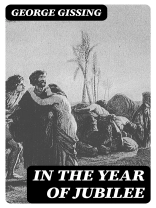George Gissing’s ‘In the Year of Jubilee’ is a poignant exploration of class, morality, and the social strife of late Victorian England. Set against the backdrop of rising industrialization and shifting social norms, Gissing employs a realistic literary style characterized by vivid characterizations and intricate social dynamics. The narrative follows the lives of various characters whose fates intertwine in the struggle for identity and fulfillment within a rigid class structure, capturing the zeitgeist of an era brimming with tension and change. Gissing’s keen observation of the human condition allows readers to ponder the larger implications of personal choices in a rapidly modernizing society. Gissing himself was shaped by a life marked by personal and professional challenges, including financial hardship and a tumultuous upbringing. His experiences as a poor scholar in London and his deep engagement with the struggles of the working class imbue his writings with authenticity and empathy. These autobiographical elements and his disdain for social hypocrisy inform the urgent themes of this novel, as Gissing strives to depict both the beauty and bleakness of human ambition. I highly recommend ‘In the Year of Jubilee’ to readers interested in a nuanced reflection on societal constraints and individual aspirations. Gissing’s adept storytelling and rich thematic concerns make this work a significant contribution to the canon of social realism. It invites readers to engage with the complexities of life during a transformative period in English history, making it a compelling read for those seeking both depth and insight.
A propos de l’auteur
George Gissing (1857–1903) was an English novelist who, despite battling financial struggles and personal turmoil, emerged as a significant literary figure in the Victorian era. Born into a middle-class family in Wakefield, Yorkshire, Gissing showed early academic promise, securing a scholarship to Owens College, Manchester. However, his budding academic career was abruptly curtailed due to a scandal involving theft, ostensibly committed to support a woman with whom he had become involved. After serving his punishment, Gissing relocated to America before returning to London to focus on a writing career. His work frequently delved into themes of social disparity, gender issues, and poverty, informed by his own experiences and keen observations of the societal changes during his lifetime. ‘In the Year of Jubilee’ (1894) is one of Gissing’s seminal works. It reflects his preoccupation with the struggles of the middle class, particularly women, in the face of rapid urbanization and cultural transformation at the end of the nineteenth century. Gissing’s novels are distinguished by psychological depth, realism, and an unflinching engagement with social issues, qualities that have led to his recognition as a prominent voice in the naturalist movement in literature. Despite the dark realism of his narratives, Gissing’s style is characterized by its nuanced character portrayals and detailed settings, which offer a vivid cross-section of contemporary Victorian life.












